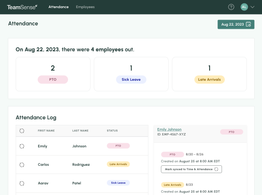Fix the root cause of No-Call No-Show with help from TeamSense
Table of Contents
According to the U.S. Bureau of Labor Statistics, just over 110,000 people were absent on any given workday in 2020.
Absenteeism costs employers $225.8 billion annually in the United States, or $1,685 per employee according to a frequently cited Centers for Disease Control and Prevention (CDC) study.
There’s no doubt that employers need to take a closer look at their attendance and absence policies as well as measuring any absences against their employees’ overall productivity.
According to SHRM, “[b]y carefully planning and designing policies, managing absenteeism, and its administration, and tackling the underlying causes (e.g., health issues, employee morale), an organization can significantly reduce the impact of employee absences on its bottom line.”
Is it legal to terminate an employee for excessive absenteeism?
Although the general answer is yes, it is accompanied by many what ifs.
If the employee’s absences are caused by medical reasons, including pregnancy or disability, you may—and more than likely would—violate the Family Medical Leave Act, the American Disabilities Act, or any applicable state laws.
These laws are complex and you should seek legal guidance if you have an employee who has excessive absences and can no longer perform his or her essential job function.
What precautions should you take as an employer when firing an employee for excessive absences?
When firing someone for excessive days off work, an employer can protect itself legally by establishing specific, written policies regarding absences. The employer must apply these policies—including both absence and accommodation request policies--uniformly to all employees.
Further, you want to implement an objective tracking system of all absences, giving you the ability to apply these policies evenly and fairly. Notify your employees of these policies, and, of course, contact your employment attorney if you have a question.

Save Hundreds of Hours A Year With TeamSense
See how TeamSense saved HelloFresh 3-4 hours per day managing attendance through text. Read the case study and book your demo today!
Get in the Know: Employers and Employees both have Rights
It’s critical to understand your rights as an employer, such as being able to terminate someone under the at-will doctrine or according to the terms of the employment agreement.
You also must understand the rights of employees, including anti-discrimination and anti-retaliation rights under both state and federal law.
The employer-employee relationship can be a complex one—especially if performance issues result from excessive absences.
Being proactive is much less costly than responding reactively in a court of law
Creating and documenting workplace absence management policies and procedures protects yourself from potential lawsuits and your employees by proving you will treat all workers fairly, giving them full notice of your expectations.

Is your call-in process terrible? Text reduces no-shows and absenteeism by up to 40%.
Don't believe us? Check out this case study to see how this 3PL benefited.
About the Author

Sheila Stafford, CEO | Leader in Applied AI for Frontline Productivity
As CEO of TeamSense, Sheila Stafford is at the forefront of increasing productivity for frontline teams through AI-driven solutions. Her visionary approach combines cutting-edge technology with a thoughtful focus on enhancing human connection; Sheila strategically implements AI where it adds the most value while recognizing the critical role of personal interaction and ensuring that human engagement remains central when it matters most. Under her leadership, TeamSense is redefining how companies support and engage their frontline teams for a more connected, efficient workplace.





